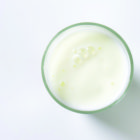
Feb 20, 2019
By Katrina Goodrich
Recently I was scrolling across my Facebook feed, as one does, and came across a plea for help from an old friend from college. She had recently given birth to her second child and was asking for ideas. She was not producing enough milk for her baby and her infant was allergic the different types of formula they had tried. One of her local friends (she lives on the East Coast now) suggested she try donor milk. Sure enough, a few weeks later she posted a picture of her adorable and much happier baby with a thank you to the moms who were now providing her with donor milk for her child.
If you are a mom (and even if you aren’t—I know and I’m not a mother), you know that things like baby formula can be very expensive especially if you have to get a certain specialty kind for your little one—and then sometimes it doesn’t work for your baby (ie they might be allergic). For a mom who is already feeling the stress that a new baby puts on her having to deal with not being able to feed her child, this can be overwhelming and can make her feel hopeless. That’s where donor milk comes in.
There are two main ways you can get donor milk or be a donor and both are a big community service. One is from a milk bank or depot. Milk banks or depots are usually attached to hospitals and used for babies who are in the NICU, etc. They do sometimes sell it, but typically it is expensive to purchase this milk. Moms who donate to the bank have to be screened and accepted. Once accepted, their milk is taken and put through a pasteurization process and combined with milk from other donors. This is my approximation of how this process works: I may not have all the details correct, but more or less how it is processed. However, any milk pumped before the screening process has occurred is not accepted into the program.
The other option to get donor milk is through informal milk sharing. Informal milk sharing can be regulated by your state, so if you chose to do this you would want to investigate the laws in your area before participating in this type of donating. For example, in Nebraska, it is illegal to sell your breast milk, but you can share it. A lot of times people will trade milk for a box of milk storage bags, etc. Typically you can find a Facebook page for people in your area where moms who have extra milk but don’t want to go through screening; or who have been screened but were not accepted (you can be rejected as a donor for a milk bank because you take herbal supplements or if your milk doesn’t have a high enough fat content, etc). They have excess milk and would like to free up some storage in their deep freeze so they post that on the page. A recipient might also post the age of their baby and why they need donor milk and find a donor that way.
So if you’re a mom who overproduces milk for your kiddo, instead of tossing it, consider donating it to other moms in need. It’s a great way to meet new people and be involved in your community in a positive way that supports other women and children in your area. I know several women who have used donor milk and how thankful they are for the women who helped them feed their children.

